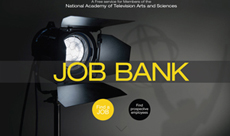48th Annual Northern California
Emmy® Awards
CALL FOR ENTRIES
Link to download Call for Entries PDF (complete)
Link to download Call for Entries – Rules PDF
Link to download Call for Entries – English Categories PDF
Link to download Call for Entries – Spanish Categories PDF
ALL ENTRIES ARE PROCESSED THROUGH
YOUR EMMY EXPRESS DASHBOARD
CLICK EMMY EXPRESS AND LOG IN WITH YOUR
EMAIL AND PASSWORD
OR CLICK
“BECOME A MEMBER” OR “BECOME A REGISTERED USER”
(You must pay 2019 membership dues in order to receive member pricing)
Entry form is located on your membership dashboard.
CHANGES FOR 2018-19
1. Composites – Minimum of two and no more than five (5) representative segments/reports. Recommend three.
2, Journalist Enterprise – deleted
3. Documentary (Spanish) – deleted
4. Continuing Education (Spanish) Within 24 hours and no time limit combined
5. Human Interest – Feature/Segment, Program/Special – New Category
6. Talent Reporter – Now two Categories: General Assignment, Specialty Assignment
Eligibility Area: The San Francisco/Northern California Chapter area (Visalia to the Oregon border), Hawaii and Reno, Nevada. This area encompasses the following Designated Market Areas: 8–San Francisco-Oakland-San Jose, 20–Sacramento-Stockton-Modesto; 54–Fresno-Visalia, 66–Honolulu, 109–Reno, 126–Monterey-Salinas, 132–Chico-Redding, 195–Eureka, and the U.S. Territory of Guam.
Eligibility Period: All entries must have been originally distributed in the eligibility area during the awards year, January 1 through December 31, 2018.
English/Spanish Language Entries: English and Spanish Language entries are separated per category and judged, scored and awarded individually.
Standard Clauses:
PURPOSE: To recognize outstanding achievements in television and allied media by conferring annual awards of merit in the Chapter’s designated award region. The presentation of these awards is intended to be an incentive for the continued pursuit of excellence for those working in the television and media industry and to focus public attention on outstanding cultural, educational, technological, entertainment, news, informational programming and craft achievements in television and online.
SUBMISSION ELIGIBILITY: To be eligible, original entries must have been transmitted to the general public by a television station, a cable company, satellite, the Internet or other digital delivery medium. Digital is defined as multimedia projects that combine various forms of traditional media with social media and interactivity, as well as linear programming delivered online (over the Internet, via various mobile platforms).
Eligibility is limited to digital and telecast/cablecast programming that was originally made available to a regional or local audience during the Chapter’s eligibility year.
Materials provided by a news service, cooperative news association or similar source must be treated as previously produced material, unless it was originally intended for first release in the regional awards eligibility area to which it was submitted with on-site supervision by the entrant.
Re-purposed material is not eligible unless it is determined to have been given a new and unique treatment.
Broadcast entries must have been intended to be of ‘primary interest’ to a regional or local audience, within the Chapter’s designated awards area, and must have had their first transmission in that awards area during the eligibility period. Entries must not have been available for viewing by more than 50% of the U.S. television homes during the eligibility year. Entries that are available to more than 50% of the U.S. television homes should be submitted to NATAS’ national awards (see exceptions).
Broadband entries must have been intended for consumption and be ‘of primary interest’ to a regional or local audience, within the Chapter’s designated awards area. It is advised that broadband content intended for a wider audience (a national audience) be submitted for consideration in The National Academy of Television Arts & Sciences’ national awards.
Cablecast entries are deemed available for an entire market if the cable channel on which they appear is generally available to that market, regardless of the actual number of subscribers the cable channel may have in the market.
However, entries which are specifically designed exclusively for their regional or local market may be accepted for regional judging, even if the retransmitting of the station’s signal by cable systems make it available to more than 50% of the American television households. This may include regional newscasts or programs dealing with issues specifically related to the local community.
For entries/programs that have been syndicated and aired in regional markets, the entrant(s) must provide a “carriage/distribution summary.” The summary must indicate all markets that carried the show, how many runs it had and the percentage of coverage.
EXCEPTIONS TO THE 50% RULE:
- Local station news coverage that may receive national exposure should be submitted to regional Emmy® Award competitions.
- Entries are eligible for regional competition if the treatment was of a local community issue, with the content primarily intended for distribution in the Chapter’s designated awards area. Works accepted for regional judging under this exception may not be submitted for national consideration.
- A documentary film that has a limited theatrical release at film festivals (showing on 600 or fewer screens in the U.S. over a one year period) before telecast or being made available online is eligible provided the program content is of primary interest to the regional or local audience.
- A local program that later receives national distribution may compete in both regional and national awards competitions, but not in the same eligibility year.
- Local segments that are eligible to participate as entries in national Emmy® Award competitions (i.e. News & Doc) may compete in both regional and national awards competitions under prevailing rules.
CONTENT ELIGIBILITY: The interpretation of the Awards Committee is final and absolute. Entries must be submitted as originally shown. There may not be any post-broadcast changes except as noted in the category descriptions.
The following programming is not eligible:
- Pornographic, violent, defamatory or offensive material.
- Previously aired programs, series or related crafts which aired and met eligibility requirements during a previous award year or another Emmy® competition.
- Program length commercials (infomercials).
- Closed circuit programs (from hotels, hospitals, movie theatres, arenas, stadiums and other venue specific locations) with special, targeted audiences.
- Content from telethons, pledge breaks and/or programs with a unique call to action aired for the purposes of raising money for political parties, charities or other related causes.
- Motion picture premiered programs that appeared in general release to the public in theatres.
- Compilation reels, “clip shows” or “best of…” programs that were edited from original content.
- Any acquired foreign productions not originated in the United States.
ENTRY PLACEMENT: When a program’s content may allow for a choice of category placement, the producer has the discretion to enter the program and its individual craft achievements in the most appropriate category where it is eligible. However, certain rules must also be considered and followed.
No entry may be submitted to more than one Chapter’s awards. The “first airing” of the entry is the primary determinationof eligibility.
Different episodes from the same program or series can only be entered in one Chapter’s awards.
Entrants are not allowed to separate program content from individual craft achievement and submit in multiple Chapters.
Attempts to adjust show titles, airdates and/or descriptions of programs in order to submit to multiple Chapters, regardless of the circumstances, is prohibited.
Ineligible entries may be disqualified during any phase of the competition.
ORIGINAL MATERIAL: At least two-thirds of an entry must consist of original material, unless previously produced material has been given some unique and creative treatment that, in the opinion of the Chapter Awards Committee, results in a new, original program. Entrants must identify all non-original or sponsored material, including its location in the program. Re-purposed material is not eligible.
ENTRY QUOTA: In order to sustain a high level of award excellence, Chapters must continue to self-regulate their entries, making sure only the appropriate individuals are recognized. To maintain this consistency, there is a maximum quota of 12 eligible names allowed on each entry. Any name(s) added beyond this number will require written authorization from the primary responsible entrant detailing the additional job title and responsibility. Chapters would then have the option of accepting these additional entrants or not.
STUDENT PRODUCTIONS: Students are not considered peer professionals and as such, their regional student productions are not eligible for Emmy® award recognition. If material is produced as part of a class, for which school credit is received, they are considered a student. If they are paid or working on a project with other “professionals,” and want to enter the Chapter’s award competition, they cannot enter as a student, but instead must pay the appropriate entries fees as an active NATAS member (or non-member). The student is then prohibited from entering subsequent student production categories with other classmates. Student award recipients from any NATAS Chapters’ high school or college competitions may not use the Emmy® name or replica of the Emmy® figure in any form of commercial advertising or promotion for their recognition.
COMPOSITES: Except where noted, a composite is defined as a sampling of a minimum of two and no more than five (5) representative segments or elements that convey to a judging panel the scope, breadth, or range of an individual’s talents or of coverage of a special event. The elements within a composite, unless otherwise noted, are to be “as aired” with no internal edits or post production work, such as music or special effects. Demo reels or montages are not allowed. One to two seconds of black between cuts, with no audio or slates must be added to separate segments within the composite. Unless otherwise noted, a straight lift from a long work may be included as an element of a composite, but there must be no editing of the lift. For program entries, composite ma-y only contain content from one episode of the series, not multiple installments.
DOUBLE-DIPPING: No single entry may be submitted in its entirety in more than one programming category. Exceptions are given for content that was part of a full newscast, or included as an excerpt in the “Overall/News Excellence, category. To be eligible for this exception in the newscast categories, the same entrant cannot be listed on the newscast entry and then use the same material and enter in another programming category.
If you enter a full program or episode from a series in a programming category, you cannot also enter a segment from the same show in another program category.
Content produced as both a multi-part series and a full-length program may be entered only once, regardless of the amount of new material added.
A single or multi episode full-length program, or a multi-part news series, all on the same subject, may only be entered in only one programming category. If the subject matter varies, different episodes from the same overall program series can be entered in other program categories as appropriate based on content. This exception rule does not apply to individual stories from news series.
An individual can only be recognized once for the same job function, utilizing the same program content.
Craft persons, like writers, photographers, editors, etc., are allowed to enter in programming categories if they directly contributed to the content of the program or segment, and have the permission of the primary producer. If a craft person does enter as a producer in a program category, they may enter the same content again in their respective craft category.
LANGUAGE OTHER THAN ENGLISH: Spanish-language entries may be entered and will be judged by a panel of Spanish-speaking, peer judges in a separate contest from English language. The scores produced by these two panels are not combined; instead the scores are interpreted separately for final “cut-off” evaluation.
Programs in languages other than English or Spanish may also be entered; however judging of these entries in their native language is subject to the availability of qualified, peer judges who speak the language of the entry. Therefore, NATAS requires that these entrants submit their entries with English subtitles or with English on a second audio channel.
WHO CAN ENTER: Membership in The National Academy of Television Arts & Sciences is not required to enter the Emmy® Awards. Management, producers, designated award directors or individual craft entrants, whether they are a NATAS member or not, may submit entries on behalf of their program, talent or craft. If submitting on behalf of another individual (s), you must fully confirm that the parties contained in the submission have complete knowledge of all eligibility rules, and have viewed and given consent to the content submitted on their behalf.
JUDGING PROCEDURE: Entries made to this Chapter will be judged by panels assembled by other NATAS Chapters. These panels should be comprised of no fewer than 7 judges who shall be certified as peers. No more than 3 judges on a panel may be employed by the same station or company. Judges may not have a conflict of interest, which is described as having a direct involvement in the production of an entry, or having a personal relationship with a member of the production staff of an entry. Group ownership, by itself, does not necessarily create a conflict of interest.
NON-COMPETITIVE JUDGING: Entries are judged against a standard of excellence on their own merit and do not compete against each other. Program submissions are scored using a 1-10 scale each for Content, Creativity and Execution. Talent and Crafts are evaluated using a 1-10 scale each for Creativity and Execution. There may be one award, more than one award or no award given in each category. Any exceptions will be noted in the category description.
JUDGING REQUIREMENT: The success of the Emmy® Awards process depends on the willingness of qualified professionals to serve as judges. Peers in other NATAS Chapters are serving this Chapter’s entrants. This Chapter will judge other Chapter’s entries. By entering, you agree to serve as a judge when asked.
All entries sent to judges for screening are deemed to be eligible by the Chapter whose work is being judged. For that reason, judges are required to score each entry regardless if they feel it has been placed in the wrong category or might have technical problems. Forms are available online should judges wish to challenge any entry. On challenge entries, judges are asked to score without bias, even if they believe an entry is not in an appropriate category.
DISCLOSURE OF JUDGING RESULTS: In order to maintain fair, consistent peer judging without influence, judges must not disclose to others or in writing, including any social media references, as to how they have voted during an on-going, active judging session. If they ignore or abuse this privilege, their ballot will be disqualified and/or their judging status eliminated.
INTENTIONAL FALSIFICATION: The entrant warrants that he/she/they are the party(ies) most responsible for the award-worthiness of the entry. The intentional falsification of production credits or entry credits may be the basis for disqualification.
ENTRY ERRORS AND OMISSIONS: The National Academy of Television Arts & Sciences assumes no responsibility for the acts or omissions of those individuals or entities submitting entries pursuant to this notice. All submitting entities and/or individuals are advised to review submissions with respect to correct name credits and other information. NATAS shall accept all submissions that are not in conflict with any of its rules and regulations.
COPYRIGHT: Each entrant agrees that any form of analog and/or digital recording, whether it be film, tape recording, screenshot or supplemental printed material that is furnished to NATAS in connection with an entry may be retained by the National Academy for file, reference and archival purposes and may be viewed partially or in its entirety for judging purposes. All of, or portions of, said content may be used on or in connection with the awards ceremony, any broadcast/telecast and other exhibition, including internet; as well as with promotional announcements or activities for any of the foregoing. If required, the entrant is further responsible for approval and clearances to the appropriate parties for any use of this copyright content.
WHO RECEIVES THE AWARD? Producers, craft persons and other eligible entrants as listed on the entry form receive the Emmy® statuette, except where noted. To be eligible, each entrant must have significant, creative involvement in the actual production. Pre and post production involvement, including proposal/grant writing, research, fundraising, producing partnerships, etc., though necessary and of major importance is not substantial enough to be considered. They must verify in writing their “hands on” involvement in order to be listed on the entry.
Once a Chapter’s award nominations are announced, there is a 10 calendar day only grace period in which names, under extreme, special circumstances, can be added to a nominated entry. These requests must be authorized in writing to the Chapter from one of the original entry nominees requesting this addition and detailing why this request should be granted. The Chapter’s Awards Committee will make the final decision and ruling.
Further, once the Emmy® awards ceremony has concluded, NO individual names can be added to an awarded entry as an additional recipient, regardless of the reason or special circumstances.
Others who work on a nominated or recognized entry may order production certificates or plaques. Individuals who did not receive a statuette, but were eligible for production certificates and/or plaques are not considered Emmy® recipients.
CRAFTS ACHIEVEMENT: In the Crafts Achievement Awards, those who actually perform a specific discipline receive the Emmy® statuette. Supervising or directing the work of others does not qualify for Crafts Achievement Awards, except for achievements in directing categories.
AWARD RECIPIENTS: Emmy® Awards are presented to individuals, not to their employers. It is the individual entrant’s achievement that is being judged and recognized, even if an employer pays entry fees.
COMMEMORATIVE STATUETTES: As a courtesy, stations, studios and production companies may order a commemorative statuette for public display at their place of business (up to a maximum of three per awarded entry). The statuette is engraved the same as the actual Emmy® Award, with the word “commemorative” added. Neither the organization’s name nor any other special wording may be engraved in place of where the individual’s name and position would usually appear. Commemorative Emmy® statuettes cannot be ordered for individuals.
PROMOTION: All publicity, advertising or any written reference undertaken by nominees and award recipients to the Emmy® Awards, must clearly state that the awarded achievement is for a Regional Emmy® Award. The word “Regional” must appear in these instances. The recipient of a nomination or an Emmy® Award may refer in advertising and publicity to the fact that they have been honored only for one year after the recognition was bestowed. They may use a replica of the Emmy® statuette in such advertising. Individuals who significantly contributed to the production or craft but were not honored with a statuette cannot specifically advertise they are an Emmy® award recipient. They can only state they worked on the recognized program.
RULES FOR THE PROTECTION OF THE EMMY® STATUETTE:
The Emmy® statue is the property of and all rights are reserved by The National Academy of Television Arts & Sciences (NATAS) and the Academy of Television Arts & Sciences (Television Academy). The Emmy® statuette may not be reproduced or used in any commercial manner unless otherwise permitted by the National Academy, it being understood that possession of the same is solely for the benefit of the recipient and the recipient’s heirs or successors in interest. If a recipient or the recipient’s heir or successor in interest proposes to sell, loan, donate or otherwise dispose of the Emmy® statuette, such persons shall be obligated to return the statuette to The National Academy of Television Arts & Sciences which will retain the same in storage in memory of the recipient.
A ® registration mark and the appropriate copyright notice: © NATAS/Television Academy must accompany any portrayal of the Emmy® statuette or moniker.
General Rules:
Entrants may submit as many different entries per program in English Categories 5-23 and Spanish Categories 55-73 as desired. There is a maximum quota of 12 submitting individuals who are eligible to receive a statuette per entry without further written permission. This request must be from the primary entrant detailing how the additional entrants specifically contributed to the Emmy®-worthiness of the entry.
Except for the craft areas, the primary person responsible for submitting the program or segment is the producer who must enter. He or she must concur that the additional entrants were also active participants.
Executive Producers acting solely as administrators, (i.e., without having hands-on or creative input) of entered programs or segments are not eligible for statuettes.
Emmy® entrants are limited to the persons who significantly participated in the creative process of the program; i.e., producer, director, photographer, writer, editor, etc.
A complete program or segment may be entered only once in English Categories 5-23 or Spanish Categories 55-73. Producers cannot enter the same material in any of these categories as program and segment producers. The same entrant cannot enter the same material in both news and program craft categories.
A multi-part series on the same topic can only be entered once in Categories 5-23 (English) or Categories 56-73 (Spanish). For example, you are not eligible to enter parts 1-3 in one category and part 4 in a different category.
For original programs longer than 30 minutes in length and not noted as having a time limit of 60 minutes, you have the option of submitting the first 30 minutes of the program or a composite of 3 unedited segments/lifts. The 3 excerpts must be the opening, middle and ending of the entry. Each excerpt should be approximately 10 minutes for a maximum total of 30 minutes.
Content must be entered in appropriate categories. For instance, an investigative report cannot be entered in the Lifestyle category, nor can a sports report be entered in Arts and Entertainment.
Program Specialty Categories 12-23 (English) or Categories 63-73 (Spanish) are not intended for stories that are investigative in nature. By definition, investigative stories include but are not limited to newsgathering techniques such as undercover or hidden camera video, public records requests or data-based journalism. The academy considers stories produced by a member of an investigative team to be investigative in nature. Investigative stories are generally not features.
An entrant may petition the Awards Committee to allow them to enter an investigative story in a program specialty category. However, the entrant will have to explain why the story should not be entered in one of the designated News Programing categories.
For example, a story may have been branded investigative by the station supers or anchor intro, but a reporter may petition the Awards Committee for an exception explaining that they did not use any investigative resources to produce the story.
Program Specialty Categories 12-23 (English) and Categories 63-73 (Spanish) are also not intended for sports reports.
Sports reports are programs produced as part of a daily or weekly sports program or newscast.
An entrant may petition the Awards Committee to allow them to enter a sports story in a program specialty category. However, the entrant will have to explain why the story should not be entered in one of the designated News Programing or Sports categories.
An example might be that a sports reporter covered a sidebar lifestyle or historical story that had nothing to do with the game or the athletes.
Entry Procedure: All entrants must submit a fully completed entry form (complete Online at www.emmysf.tv), the applicable entry fee(s), and upload their entry through JW Platform as “aired,” except for removing commercials. The total running time and air date(s) of each entry must be provided on the entry form. As an aid to judges, a précis (written description of your entry) may be submitted stating why the entry is award-worthy. Space is provided on the entry form, up to 100 words, for this purpose. Enter online in the “description” section. This précis information will automatically be included on the ballot and read by judges prior to viewing.
In Categories 5-23 (English) or Categories 55-73 (Spanish), a member of the production team may submit the entry if the submission is accompanied by a note naming the producer and stating that he/she has declined to participate.
Entry Format: After completing the Emmy® Express online entry form, you will be prompted to upload your video. Just follow the step by step process. The best quality of encoding is 1920×1080 or 1280x720p; should be a minimum 720×480. Do NOT letterbox your video. Depending on the length of your entry and your internet connection, the upload may take a long time. Click the Clear Session button before starting a reload. Do not close your browser until the status bar tells you the upload is complete. You must view and approve your video for final submission. All judging and balloting of your entry is done online.
Please contact the National Academy Chapter office if you have a problem with the online entry or the uploading instructions. Entrants are responsible for the technical quality of their entries.
Entry Fees: The appropriate member or non-member entry fee is required for each person listed as an entrant.
Each Individual Name on Entry
. San Francisco Fresno Reno/Salinas/Chico/
‘ San Jose Sacramento Hawaii Eureka/Guam
NATAS Member*: $75 $70 $60 $50
Non-Member: $210* $200* $160* $125*
LATE FEES: (late entries and unpaid entry fees after grace period)
NATAS Member*: $100 $95 $85 $75
Non-Member: $235* $225* $185* $150*
*Your membership must be paid through 2019 prior to completing the entry form to receive the member rate. If you are joining NATAS for the first time or are a returning member, you must pay membership dues prior to completing the entry form to receive the member rates.
Payment: Credit/Debit Card, American Express, VISA, MasterCard or Discovery.
JOIN THE NATIONAL ACADEMY TODAY AND SAVE $$$
Membership in The National Academy of Television Arts & Sciences is not required to enter the Emmy® Awards. *By joining the National Academy you save $20 on your first entry and up to $130 on additional entries. See online membership form for dues fees based on market area. If you were not a member in good standing during 2018, you must re-join NATAS as a new/returning member.
Winning Entry Broadcast Waiver: I (we) agree by submitting and therefore entering my/our Emmy® entry, grant the Chapter the following: Full and complete authority for the Chapter to broadcast, edit, and or make any other changes they deem necessary to my/our entry at their sole discretion. The Chapter is granted full and complete authority to include my/our entry in an Emmy® broadcast, other related broadcasts, and Emmy® website streaming.
WARNING: After the January 11th entry deadline, any entry or entrant that is still incomplete (including membership and entry fees) will be subject to a $25 reprocessing charge or disqualification. If an entry must be reprocessed, the original entry fee will not be returned. Sunday, March 31st, will be the FINAL date to submit changes or omissions to entries.
Awards Procedure: The Awards Committee is vested with the authority to determine the eligibility of entries and to change any entry’s category if improperly submitted. Such decisions are final. To that end, the Awards Committee will have a master list of entries available on-line for review on or about Monday, January 21. All interested parties should review this list for accuracy as to entrant names, titles, and appropriate fees. Each station or organization will be asked to have a contact person available to answer questions that arise regarding its entries. The Awards Committee will meet the weekend of January 25 & 27 for final certification of all entries.
Nominations: Emmy® nominations will be announced in a live webcast at 8 am on Wednesday, May 8, 2019 (www.emmysf.tv). Each person nominated receives a certificate, suitable for framing. Nomination Certificates will be available at nominations parties or may be pickup at the Emmy® Awards Gala.
The Award: Emmy® Gala 2019, Saturday, June 8th SFJAZZ Center, San Francisco.
Advanced reservations to this Black Tie Event are required. At the Awards Ceremony, only one individual may be designated to give a brief acceptance speech on behalf of all the recipients for the entry. All recipients will have the opportunity to be interviewed on the red carpet. The awards presentation and red carpet will be webcast.
Emmy® statuettes will be awarded only to those individuals listed on the entry form. Remember, the last date to add names is Sunday, March 31st After the Awards presentation, production certificates or plaques may be ordered to honor those individuals the recipients feel contributed to their award-winning entry. These certificates and plaques are available from the chapter office.
Questions:
Wayne Freedman 415-672-9144 Darryl Compton 650-341-7786
Awards Chair wayne.freedman@abc.com Executive Director darryl@emmysf.tv
Awards Committee members who are also available to answer questions:
San Francisco/Oakland/San Jose:
KTVU 2 Steve Shlisky 510-874-0499 steve.shlisky@emmysf.org
KRON 4 Alecia Reid 415-385-1612 aleciakried@gmail.com
KPIX 5 Julie Watts 415-765-8809 julie@juliewatts.net
. Da Lin 510-886-4055 da-phoenix@juno.com
ABC 7 Melanie Woodrow 510-701-3607 melanieannwoodrow@gmail.com
KQED Peter Borg 415-553-2393 pborg@kqed.org
KDTV Luis Godinez 415-538-8013 lgodinez@univision.net
. Luz Pena 917-538-3189 luzpena.a@gmail.com
KSTS Arlen Fernandez 408-432-4528 arlen.fernandez@nbcuni.com
Sacramento:
KCRA Randy Forsman 916-325-3323 rforsman@hearst.com
KUVS Tony Martinz 916-614-1906 tmartinez@univision.net
Fresno:
ABC 30 Richard Harmelink 559-365-9340 richard.l.harmelink@abc.com
Reno:
KOLO 8 Terri Russell 775-858-8880 x227 trussell@kolotv.com
Hawaii:
KHON 2 Pamela Young 808 497-9221 pamela.young@khon2.com
Crafts
Craig Franklin 415-816-1039 craigfranklin2011@gmail.com
Sports
SF Giants Paul Hodges III 415-972-1553 phodges@sfgiants.com
At Large Scott Patterson 415-338-6172 spatters@sfsu.edu
Keith Sanders 408-924-2866 keith.sanders@sjsu.edu
Administration:
Awards Chair Wayne Freedman 415-672-9144 wayne.freedman@abc.com
Ex. Director Darryl Compton 650-341-7786 darryl@emmysf.tv
President Steve Shlisky 510-874-0499 steve.shlisky@emmysf.org
National Linda Giannecchini 415-553-2245 lgiannecchini@kqed.org
Link to download Call for Entries – English Categories PDF
Link to download Call for Entries – Spanish Categories PDF
REMINDER NOTES
- Entry Form:
Please use Upper and Lower Case when filling out your entry form and membership application. The name you use on your membership application will show on your entry forms. - Region:
We are accepting entries from the S. Territory of Guam. - Entry Quota:
There is a maximum quota of 12 eligible names allowed per entry without further written permission. Any additional names will require a written request from the primary entrant detailing how the additional entrants specifically contributed to the Emmy®-worthiness of the entry. - Judging Requirement:
By entering, all entrants agree to be peer judges for categories submitted from other NATAS chapters. Members who do not judge within a 24-month period will forfeit their member discount and will be required to pay the full non-member Emmy® entry fee for each entry they submit until they serve as a judge. - Video Upload:
The person filling out the entry form is responsible for the video upload. - Deadline:
A $25 processing fee will be added to all fees not paid by the end of the grace period. - Montages:
No Montages are allowed. Segments must be separated by one to two econds of black. - Composites:
You must list your segments (Title, Air Date, & TRT) in the remarks section of the entry form. (LIMIT FIVE) Must be edited into one entry with black between cuts. (MAXIMUM SEGMENTS FIVE) - Double-Dipping:
No single entry may be submitted in its entirety in more than one programming category. An entrant cannot enter the same content in more than one category.Individual segments or stories that aired as part of a multi-part program or series on the same subject may be entered in only one category. An entrant cannot enter individual stories from that series in different categories. Content produced as both a multi-part series and a full-length program may be entered only once, regardless of the amount of new material added.Content produced as a single report that later aired as part of a longer program or special may be entered only once. An entrant may not enter a single story in one category and also enter a longer program or special that includes that story in another category. A. Double-Dip Exception 1: Craft Categories
An individual can only be recognized once for the same job function, utilizing the same program content. However, craft persons (photographer, editor, reporter, writer, etc.) who also preformed another role on a specific entry (i.e. producer) may submit the entry in the programing category and again in their respective craft category as long as the second entry specifies a different job function.This exception does not apply to the Video Journalist categories because those entrants are performing multiple roles and being recognized for this expertise. However, as an option, they could enter each specific craft they performed individually instead of collectively.B. Double-Dip Exception 2: Overall Excellence/News Excellence, and Newscasts
Content that is included in these categories could be entered in a second category, but not in its entirety. To be eligible for this exception in the newscast categories, the same entrant cannot be listed on the newscast entry and then use the same material and enter in another programming category.
- Appropriate Categories For Content:
Content must be entered in appropriate categories. For instance, an investigative report cannot be entered in the Lifestyle category, nor can a sports report be entered in Arts and Entertainment. The Awards Committee has the authority to disqualify or move an entry submitted in an inappropriate category. - Program Specialty Categories:
Program Specialty Categories 12-20 (English) and Categories 63-73 (Spanish) are not intended for stories that are investigative in nature or sport reports. An entrant may petition the Awards Committee to allow them to enter an investigative or sports story in a program specialty category. However, the entrant will have to explain why the story should not be entered in one of the designated News Programing or Sports categories.
Stories that include investigative newsgathering techniques like undercover or hidden camera video, public records requests or data-based journalism, and stories that are produced by a member of an investigative team may be considered investigative in nature.
Reports that include coverage of athletics, that aired in a daily or weekly sports program or newscast; or as part of a sports special, may be considered sports stories. - Category Changes
You may change the category of an entry until Friday, January 25, 2019. There is a $25 processing fee. - Refunds are subject to a $25 processing fee.
Need help / Questions: darryl@emmysf.tv 650-341-7786
Entry Deadline: Friday, January 11, 2019
Deadline to Upload Entry to JW Platform: Friday, January 18, 2019
Link to download Call for Entries PDF (complete)
Link to download Call for Entries – Rules PDF
Link to download Call for Entries – English Categories PDF
Link to download Call for Entries – Spanish Categories PDF
ALL ENTRIES ARE PROCESSED THROUGH
YOUR EMMY EXPRESS DASHBOARD
CLICK EMMY EXPRESS AND LOG IN WITH YOUR
EMAIL AND PASSWORD
OR CLICK
“BECOME A MEMBER” OR “BECOME A REGISTERED USER”
Link to Emmy Express
(You must pay 2019 membership dues in order to receive member pricing)
Entry form is located on your membership dashboard.










